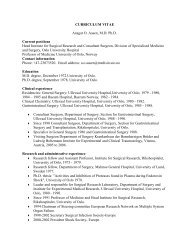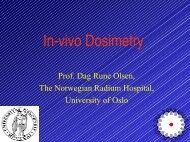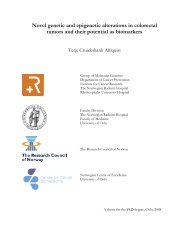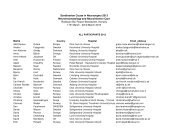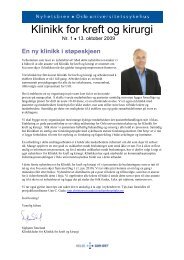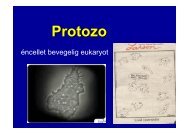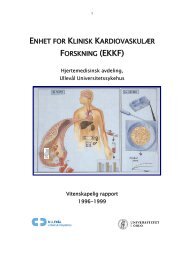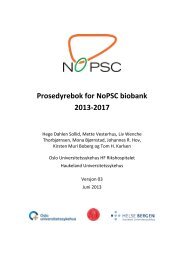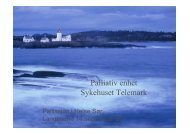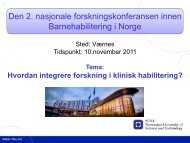Preface - Ous-research.no
Preface - Ous-research.no
Preface - Ous-research.no
Create successful ePaper yourself
Turn your PDF publications into a flip-book with our unique Google optimized e-Paper software.
Modulation of mo<strong>no</strong>cyte inflammatory responses:<br />
Effects of 9cisRA and the impact of surgical trauma<br />
Principal Investigator:<br />
Ingrid B. Moss Kolseth, medical student (OUH/UiO)<br />
Supervisor:<br />
Maria K. Dahle PhD (UiO)<br />
Aims<br />
Elucidate the influence of 9cisRA on the inflammatory responses of human mo<strong>no</strong>cytes<br />
Evaluate the state of inflammatory responses and inflammatory modulation mechanisms in whole blood from colon cancer patients<br />
before and after laporascopic surgery.<br />
Background<br />
Vitamin A or reti<strong>no</strong>l is crucial for the body homeostasis. Two nuclear receptors mainly convey the activity of reti<strong>no</strong>ic acid (RA). The<br />
reti<strong>no</strong>id acid receptors (RARs) bind all-trans-(atRA) and 9-cis reti<strong>no</strong>ic acid (9cisRA). The reti<strong>no</strong>id X receptors (RXRs) bind 9cisRA only. In<br />
previous studies by Kolseth, 9-cis reti<strong>no</strong>ic acid (9cisRA) was shown to modulate inflammatory responses in human adherent mo<strong>no</strong>cytes.<br />
Surgery has a profound effect on innate immune responses. The whole blood model allows ex vivo monitoring of human inflammatory<br />
responses and inflammatory modulation pathways in circulating immune cells. In a collaborative study with Professor Egil Johnson,<br />
MD and PhD-student Dag T. Førland and co-workers at Oslo University Hospital Ullevaal we investigate the status of immune modulatory<br />
mechanisms in patients having elective colon resections performed with minimal invasive techniques. In total, 20 patients with<br />
respectable colon cancer (left and right) (T1-3 N0-1) will be included.<br />
Projects 2010<br />
Experiments has been performed showing that treatment of adherent mo<strong>no</strong>cytes by 9cisRA increases the ability to induce further<br />
recruitment of mo<strong>no</strong>cytes. Possibly through the production of Mo<strong>no</strong>cyte Chemotactic Protein (MCP) -1.<br />
In the study on surgical patients, samples from the first 13 patients were analysed. Results show strong inflammatory responses to LPS<br />
in samples taken prior to colon surgery, whereas directly after surgery, most inflammatory mediator responses were abolished. Several<br />
inflammatory cytokine responses remained decreased for up to 3 days, whereas anti-inflammatory mediators were increasingly<br />
induced at day 1 and 2 postoperatively. The appearent shift towards anti-inflammatory responses corresponded with an increase in<br />
suppressor of cytokine signaling (SOCS) 3 mRNA in patient mo<strong>no</strong>cytes. Preliminary results from this study was presented at the joint<br />
FEBS/EFIS Workshop “Inflammatory Diseases & Immune Response: Basic Aspects, Novel Approaches & Experimental Models”, in Vienna<br />
october 2010. In 2011, all 20 patients are planned to be included, analysed and final results reported.<br />
Kolseth finished the Medical Student Research Program in <strong>no</strong>vember 2010, and results were presented in a thesis entitled “Modulation<br />
of mo<strong>no</strong>cyte inflammatory responses: Effects of 9cisRA and the impact of surgical trauma”.<br />
57





